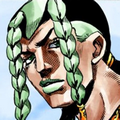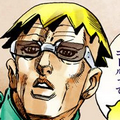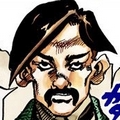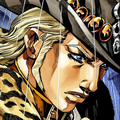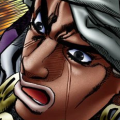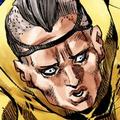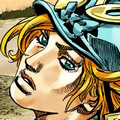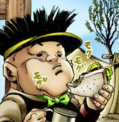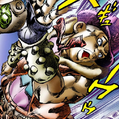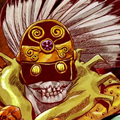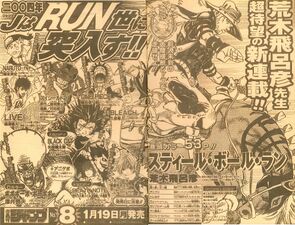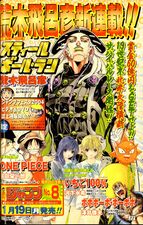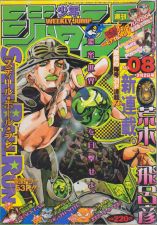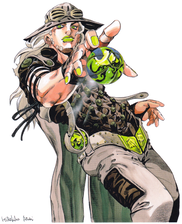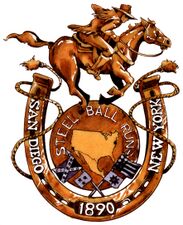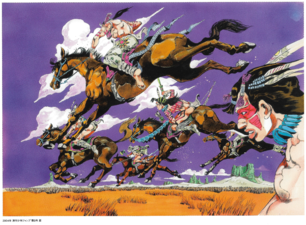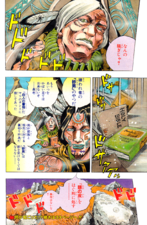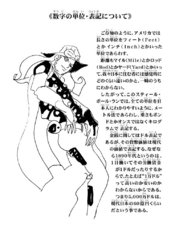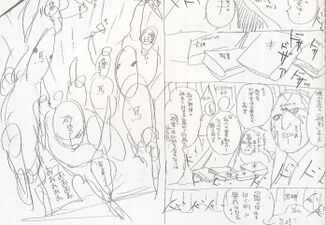Steel Ball Run - Chapter 1
The Steel Ball Run Press Conference (スティール・ボール・ラン 記者会見, Stīru Bōru Ran Kisha Kaiken), originally San Diego Beach - September 23, 1890 - 2 Days to Start (サンディエゴビーチ 1890年9月23日 スタート2日前, San Diego Bīchi 1890-nen 9-gatsu 23-nichi Sutāto Futsuka Mae) in the WSJ release, is the first chapter of Steel Ball Run and the 753rd chapter of the JoJo's Bizarre Adventure manga.
It is the first chapter of the new continuity of JoJo's Bizarre Adventure after the end of the previous continuity that contained Parts 1-6. Beginning from this chapter onwards, the story now takes place in an alternate continuity separate from the previous one.
Summary
A ruckus is heard in an unnamed Native American village, where the chief is informed that the man named Sandman has been keeping English literature with him. This is considered a crime, and Sandman is pursued by his fellow villagers. However, he somehow manages to outrun them on foot while the villagers are riding horses. Sandman then uses a horse to kick himself higher and reach the top of a rocky formation, escaping his pursuers. A mysterious hand materializing out of Sandman's arm is seen blinding a horseman with sand. When Sandman climbs to the top of the rocky mountain, he sees his sister, who beats him and orders him to apologize to the village.
Sandman refuses, explaining that their community will have to study their enemy, the White Man, in order to survive. Later, in a conversation with his sister, he indicates a multitude of perfectly hemispherical hand-sized depressions in a rock face. He says that it's evidence of an impossible horseback leap and that the tool they used is likely made by a white man. He then shows his sister a newspaper headline regarding the Steel Ball Run race, with a grand prize of $50,000,000.
Elsewhere, a man reports complications in the logistics of the race to Steven Steel, the promoter of the race; they depict an over-admission of (culturally diverse) entrants. Steel rudely tells the assistant off, ordering him to stop any disorder, and failing that, throw any troublemaker out of the race. When the assistant leaves, Steven jumps into the arms of his young wife Lucy, expressing his doubts about whether he can handle the race, but Lucy reassures him.
Later, Steven holds a press conference. Given the race's rules, he explains that the Steel Ball Run race will start on the Pacific San Diego beach at 10 a.m. on September 25, 1890. The goal is New York, at a distance of ~6000 km. First place will receive $50,000,000; second will receive $1,000,000; third will receive $500,000; fourth will receive $250,000; fifth will receive $120,000; and so on, up to 10th place, along with special checkpoint prizes. The only condition for participants is an age of over 16 years and a participation fee of $1200. Projecting a race time of 60 – 80 days, Steven mentions the rule that changing horses is not allowed. Weapons are allowed, but not crime. Steven names Mountain Tim, Urmd Avdul, Dot Han, and Diego Brando as among the most famous entrants. Finally, he rejects a question about his wife Lucy, who's suggested to be 14 years of age.
As a man drops a pouch of coins on a counter, the clerk reiterates the Steel Ball Run race rules, then asks for the former's signature. The man is given a race commemoration medal and badge, with the identifying number B-636. He signs "Gyro Zeppeli" and grins widely, revealing his shining teeth.
A man reaches for Gyro's Steel Ball from behind him. When he touches it, he is forced to his knees, unable to stand. When the clerk notes that Gyro's fee is short $20, Gyro uncovers the missing money out of the man's hands.
Appearances
Author's Comment
As you know, in the United States, length is measured in feet and inches. Distances are measured in miles, rods, and yards, and those of us living in Japan have no immediate grasp of how far distances are when measured that way. Therefore, in Steel Ball Run, all units are measured via the metric system to allow easier comprehension by Japanese readers; for example, weights are measured in kilograms, rather than pounds or ounces. The currency remains the dollar, but its value is changed to its modern value. Back in 1890, a day's labor would only earn a worker one dollar, so it would be difficult to gauge whether, say, a $10,000 prize would be extravagant or pitiful. In short, the $50,000,000 prize is roughly equivalent to around six billion modern Japanese yen.
ご存知のように、アメリカでは長さの単位をフィート(Feet)とか インチ(Inch)とかいった単位であらわす。
距離もマイル(Mile)とかロッド(Rod)とかヤード(Yard)とかいって、我々日本に住む者には感覚的にどのくらい遠いのかと、一瞬のうちにわからない。
したがって、このスティール・ボール・ランでは、全ての単位を日本人にわかりやすいように、メートル法であらわし、重さもポンドとかオンスではなくキログラムで 表記する。
金銭に関してはドル表記であるが、その貨幣価値は現代の価値で表記する。なぜなら1890年代というのは、1日働いてその労働賃金が1ドルだったりするからで、たとえば“1万ドル”って高いのか安いのかわからないからである。
Gallery
References
Site Navigation
